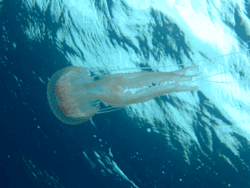|
Mediterranean
contribution to the Global Conference on
Oceans
23 January 2006
 The
Mediterranean Sea represents less than 1%
of the total area covered by the world's
oceans. The Sea is also known for the considerable
diversity of its fauna and flora as well
as for the high rate of endemism. However,
approximately 30% of the international sea-borne
trade volume transits through the Mediterranean
Sea and it is also the world's leading tourist
destination with 220 million visitors each
year. All these along with 23 countries
with diverse regimes make the Mediterranean
a special case on the international arena.
A panel to debate all these issues and the
Mediterranean contribution to the Global
Conference on Oceans (23-28 January, Paris)
will be chaired by Aldo Cosentino (Director-General,
Nature Protection, Ministry for Environment,
Italy) and will take place on 26th January
during the conference. The
Mediterranean Sea represents less than 1%
of the total area covered by the world's
oceans. The Sea is also known for the considerable
diversity of its fauna and flora as well
as for the high rate of endemism. However,
approximately 30% of the international sea-borne
trade volume transits through the Mediterranean
Sea and it is also the world's leading tourist
destination with 220 million visitors each
year. All these along with 23 countries
with diverse regimes make the Mediterranean
a special case on the international arena.
A panel to debate all these issues and the
Mediterranean contribution to the Global
Conference on Oceans (23-28 January, Paris)
will be chaired by Aldo Cosentino (Director-General,
Nature Protection, Ministry for Environment,
Italy) and will take place on 26th January
during the conference.
 The
Mediterranean can bring three examples of
cooperation amongst countries. The
Mediterranean can bring three examples of
cooperation amongst countries.
The Mediterranean is a vulnerable ecological
unit whose protection requires the joint
action of its users and cooperation between
North and South. In terms of governance
of high seas, the Mediterranean is an emerging
and unresolved sea case. More than 80% of
this semi enclosed sea falls under the High
seas regime. Some Mediterranean countries
have recently undertaken cooperative initiatives
to protect marine areas such as the Pelagos
Sanctuary for Mediterranean Marine Mammals,
supported by France, Monaco and Italy. The
Mediterranean Sea represents an interesting
and stimulating case for strengthening governance
and international law in relation to oceans.
See:http://iucn.org/places/medoffice/en/en_high_seas.html
Also this year the General Fisheries Commission
for the Mediterranean (GFCM) - the main
inter-governmental decision-making body
on fishery management in the Mediterranean
-decided to refrain from expanding deep
water fishing operations beyond the limit
of 1000 metres based on scientific considerations.
This important measure was based on a comprehensive
study on the status of deep sea fishing
in the Mediterranean developed by the World
Conservation Union (IUCN) and WWF. The measure
has also been debated in a wide-reaching
consultation process with relevant regional
specialists, including the International
Commission for the Scientific Exploration
of the Sea (CIESM), through several workshops
held over the last 18 months.
See: http://iucn.org/places/medoffice/noticias/ban_fisheries_en.html
Other area of interest is marine aquaculture.
The IUCN Centre for Mediterranean Cooperation
is developing in collaboration with the
Regional Activity Centre for Specially Protected
Areas (RAC/SPA), the Federation of European
Aquaculture Producers (FEAP) and various
national organizations from Spain, Algeria
and France a programme that aims to highlight
the real problems that aquaculture can cause
to the marine environment, and to find possible
solutions in order to allow its development
in a sustainable way.
See: http://iucn.org/places/medoffice/cd_aquaculture/index.html
The Mediterranean experience can bring
support to global discussions on means for
achieving the goals set at the World Summit
on Sustainable Development to sustainably
manage the sea, consistent with international
laws, and based on scientific data, by 2012.
Interesting links:
Third
Global Conference on Oceans, Coasts, and
Islands. January 23-28, 2006, UNESCO, Paris
IUCN
Global Marine Programme
For
further information, please contact
François
Simard.
|